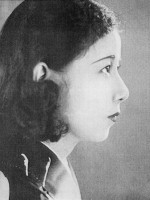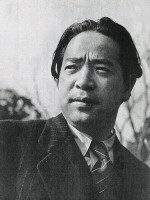Tokyo March is a japonais film of genre Drama directed by Kenji Mizoguchi with Shizue Natsukawa
Tokyo March (1929)
Tōkyō kōshinkyoku
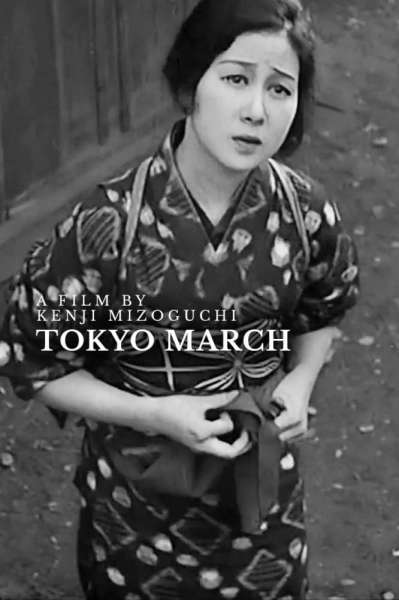
If you like this film, let us know!
- Infos
- Casting
- Technical infos
- Photos
- Videos
- Film quotes
- Characters
- Music
- Awards
Tokyo March (東京行進曲, Tōkyō kōshinkyoku) is a 1929 black and white Japanese silent film, originally presented with benshi accompaniment, directed by Kenji Mizoguchi. It is a classic melodramatic love tragedy addressing social inequality in modern Japan, depicted in Mizoguchi's typical style. The theme song "Tokyo March" was originally sung by Chiyako Sato.
Synopsis
Il existe deux versions de ce film dans son montage court. Une française, muette, restaurée en 1999 par la Cinémathèque française à partir d'une copie-travail nitrate provenant de ses collections et une japonaise presque identique mais plus courte, il manque par exemple quelques scènes du mariage d'Orie et de Yukichi, mais commentée par un benshi. Les intertitres des deux versions comportent des différences. Le synopsis ci-dessous se base sur la version japonaise.Actors
Comments
Leave comment :
Suggestions of similar film to Tokyo March
There are 22 films with the same actors, 36 films with the same director, 68279 with the same cinematographic genres (including 13434 with exactly the same 2 genres than Tokyo March), 6889 films with the same themes (including 3827 films with the same 2 themes than Tokyo March), to have finally 70 suggestions of similar films.If you liked Tokyo March, you will probably like those similar films :

The Crucified Lovers (1954)
, 1h42Directed by Kenji Mizoguchi
Origin Japon
Genres Drama, Romance
Themes Seafaring films, Sports films, Transport films, Martial arts films
Actors Kazuo Hasegawa, Kyōko Kagawa, Ichirō Sugai (菅井一郎), Eitarō Shindō, Eitarō Ozawa, Yōko Minamida
Rating79%





Ishun (Shindo) is a wealthy but miserly scroll-maker in Kyoto, especially regarding his younger wife Osan (Kagawa), who was from an impoverished family, and married Ishun for money.

Flame of My Love (1949)
, 1h36Directed by Kenji Mizoguchi
Origin Japon
Genres Drama, Romance
Themes Seafaring films, Transport films
Actors Kinuyo Tanaka, Mitsuko Mito, Kuniko Miyake, Eitarō Ozawa, Ichirō Sugai (菅井一郎), Sadako Sawamura
Rating72%





1884. La militante féministe, Toshiko Kishida se rend à Okayama, où Eiko Hirayama a fondé une école destinée à promouvoir une conception neuve du rôle de la femme dans la société japonaise. Eiko découvre, par exemple, que Chiyo, la fille des domestiques de sa propre famille, a été vendue à un habitant de Tokyo. Hélas, l'école de Eiko est bientôt fermée par les autorités. Elle se voit contrainte de partir pour Tokyo afin de se rendre au siège du Parti libéral, pourtant menacé de dissolution. Là, elle devient chroniqueuse pour le journal du Parti et se lie avec Kentaro Omoi, le responsable du mouvement. Elle va enquêter, notamment, sur la révolte des fermiers de la soie à Chichibu. Ceux-ci luttent, en particulier, contre les terribles conditions de travail imposées aux ouvrières des filatures. Eiko assiste à l'esclavage de ces femmes qui, de plus, sont souvent battues, torturées voire violées. Parmi celles-ci, elle reconnaît Chiyo. Cette dernière vient précisément d'incendier un bâtiment. Omoi, Eiko et Chiyo sont tous trois accusés de complicité et arrêtés. Chiyo, enceinte, se donne à un gardien dans l'espoir d'obtenir un moyen d'évasion. Au lieu de cela, elle est violemment frappée et son bébé mourra. Plus tard, Eiko apprend qu'Omoi, qui désire l'épouser, a aussi pour maîtresse Chiyo. Omoi trouve cette situation normale. Eiko comprend, dès lors, qu'il y a beaucoup à faire pour modifier la mentalité masculine japonaise. Mais, persévérante, elle continue son combat, d'autant que le contexte politique, désormais plus favorable, lui permet de rouvrir son école à Okayama. Dans le train qui la ramène vers sa ville natale, Eiko est rejointe par Chiyo.

A Geisha (1953)
, 1h25Directed by Kenji Mizoguchi
Origin Japon
Genres Drama
Themes Seafaring films, Transport films
Actors Michiyo Kogure, Ayako Wakao, Saburo Date, Haruo Tanaka, Chieko Naniwa, Eitarō Shindō
Rating75%





Eiko is in the search of the okiya run by the geisha Miyoharu. As she approaches the screen doors, she witnesses an exchange between Miyoharu and a client. The client, greatly indebted and unable to afford Miyoharu's services, is coldly and mockingly berated by Miyoharu for his presumptuousness. Enraged by the sudden demise of her affected desire for him and her mercenary attitude.

Ugetsu (1953)
, 1h37Directed by Kenji Mizoguchi
Origin Japon
Genres Drama, Science fiction, Thriller, Comedy, Fantasy, Horror, Historical
Themes Seafaring films, Sports films, Transport films, Martial arts films, Ghost films
Actors Masayuki Mori, Machiko Kyō, Kinuyo Tanaka, Mitsuko Mito, Eitarō Ozawa, Ryosuke Kagawa
Rating80%





Ugetsu is set in villages which line the shore of Lake Biwa in Ōmi Province in the late 16th century. It revolves around two peasant couples – Genjurō and Miyagi, Tōbei and Ohama – who are uprooted as Shibata Katsuie's army sweeps through their farming village, Nakanogō. Genjurō, a potter, takes his wares to nearby Ōmizo. He is accompanied by Tōbei, who dreams of becoming a samurai. A respected sage tells Miyagi to warn her husband about seeking profit in time of upheaval, and to prepare for a probable attack on the village. Genjurō arrives with his profits, but she asks him to stop. Genjurō nevertheless works long hours to finish his pottery. That night Nakanogō is attacked by soldiers, and the four main characters hide out in the woods.

The 47 Ronin (1941)
, 3h43Directed by Kenji Mizoguchi
Origin Japon
Genres Drama, Historical
Themes Seafaring films, Sports films, Théâtre, Transport films, Martial arts films, Samurai films, Films based on plays
Actors Mieko Takamine, Daisuke Katō, Isamu Kosugi, Masao Shimizu, Utaemon Ichikawa, Mitsuko Miura
Rating71%





Après l'injuste condamnation à se faire hara-kiri infligée à un jeune samouraï, quarante-sept de ses compagnons le vengent en se faisant à leur tour hara-kiri sur sa tombe.
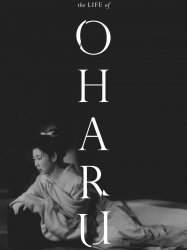
The Life of Oharu (1952)
, 2h28Directed by Kenji Mizoguchi
Origin Japon
Genres Drama
Themes Seafaring films, Films about sexuality, Sports films, Transport films, Erotic films, Films about prostitution, Martial arts films, Erotic thriller films
Actors Kinuyo Tanaka, Ichirō Sugai (菅井一郎), Toshiro Mifune, Takashi Shimura, Chieko Higashiyama, Jūkichi Uno
Rating80%





The story opens on Oharu as an old woman in a temple flashing back through the events of her life. It begins with her love affair with a page, Katsunosuke (Toshirō Mifune), the result of which (due to their class difference) is his execution and her family's banishment. Oharu attempts suicide but fails and is sold to be the mistress of Lord Matsudaira with the hope she will bear him a son. She does, but then is sent home with minimal compensation to the dismay of her father, who has worked up quite a debt in the meantime. He sends her to be a courtesan, but there, too, she fails and is again sent home. She goes to serve the family of a woman who must hide the fact that she is bald from her husband. The woman becomes jealous of Oharu and makes her chop off her hair, but Oharu retaliates, revealing the woman's secret. She again must leave—this time she marries a fan maker who is killed shortly after during a robbery. She attempts to become a nun, but Oharu is thrown out after being caught naked with a man seeking reimbursement for an unauthorized gift (it is made clear this is rape by Oharu's claims and distraught demeanor). She is thrown out of the temple, becomes a prostitute, but fails even at that. In the end, she is recalled to the Lord's house in order to keep secret her activities and to be exiled within the compounds to keep her secrets locked away. While being scolded for the life she chose, she attempts to find her son, and in the process, ends up running away as she chooses the life of a beggar over the life in exile.
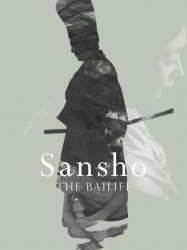
Sansho the Bailiff (1954)
, 2h4Directed by Kenji Mizoguchi
Origin Japon
Genres Drama
Themes Seafaring films, Sports films, Transport films, Martial arts films
Actors Kinuyo Tanaka, Kyōko Kagawa, Eitarō Shindō, Ichirō Sugai (菅井一郎), Ken Mitsuda, Masahiko Tsugawa (津川 雅彦)
Rating83%





Sansho the Bailiff is a jidai-geki, or historical film, set in the Heian period of feudal Japan. A virtuous governor is banished by a feudal lord to a far-off province. His wife and children are sent to live with her brother. Several years later, the wife, Tamaki (Kinuyo Tanaka), and children, Zushiō and Anju, journey to his exiled land, but are tricked on the journey by a treacherous priestess. The mother is sold into prostitution in Sado and the children are sold by slave traders to a manorial estate in which slaves are brutalized, working under horrific conditions and branded when they try to escape. The estate, protected under the Minister of the Right, is administered by the eponymous Sanshō (Eitarō Shindō), a bailiff (or steward). Sanshō's son Tarō (Akitake Kōno), the second-in-charge, is a much more humane master, and he convinces the two they must survive in the manor before they can escape to find their father.

Utamaro and His Five Women (1946)
, 1h35Directed by Kenji Mizoguchi
Origin Japon
Genres Drama
Themes Seafaring films, Peinture, Sports films, Transport films, Martial arts films
Actors Kinuyo Tanaka, Bandō Mitsugorō VIII, Hiroko Kawasaki, Toshiko Iizuka
Rating69%





The story is set in Edo (now Tōkyō) in Japan. The film starts with a parade of samurai and their concubines (oiran, distinguished by their high shoes) along an avenue of cherry trees. Koide, called Seinosuke by his woman (Kotaro Bando), an artist/samurai apprenticed to a Kanō master, leaves the parade and visits a print shop where he sees a woodcut print by Utamaro that boasts of ukiyo-e 's superiority to the official style. Enraged, he goes to a tea-house to find Tsutaya Jūzaburō, the owner of the print shop, to express his displeasure. Word is leaked to Utamaro to avoid the tea-shop, but instead he goes there directly to investigate. Koide then challenges him to a duel. Utamaro counter-challenges him with a different kind of duel––a painting contest.

Sisters of the Gion (1936)
, 1h36Directed by Kenji Mizoguchi
Origin Japon
Genres Drama
Themes Seafaring films, Films about sexuality, Transport films, Erotic films, Films about prostitution, Erotic thriller films
Actors Isuzu Yamada, Yōko Umemura, Eitarō Shindō
Rating73%





The story centers around two sisters (Umekichi and Omocha), who are geisha, living in an okiya of their own in the licensed pleasure district of Gion, Kyoto. The two women have very different outlooks on relationships with men. Umekichi, the elder sister, is the ideal geisha; she grew up going to dance and music lessons, wears kimono, and has a strong sense of giri, or loyalty, to her patron. Umekichi’s younger sister, Omocha, was educated in public schools and wears western clothing, except when she is working as a geisha. Unlike Umekichi, Omocha doesn’t trust men and believes that they will only use geisha and then abandon them without a care. Thus, she uses men to her own advantage. In doing so she is willing to manipulate and lie to her customers.

Taira Clan Saga (1955)
, 1h48Directed by Kenji Mizoguchi
Origin Japon
Genres Drama, Adventure, Historical
Themes Seafaring films, Sports films, Transport films, Martial arts films, Samurai films
Actors Ichikawa Raizō VIII, Michiyo Kogure, Koreya Senda, Eijirō Yanagi, Akitake Kōno, Tamao Nakamura
Rating72%





Japon, XII siècle, moines et nobles s'opposent. Le clan Taïra, dirigé par Tadamori, a du mal à être considéré à sa juste valeur par la cour. Le fils de Tadamori, Kiyomori, apprend qu'il est peut-être en réalité le fils de l'ancien empereur, qui était l'amant de sa mère, une courtisane.
 Connection
Connection
